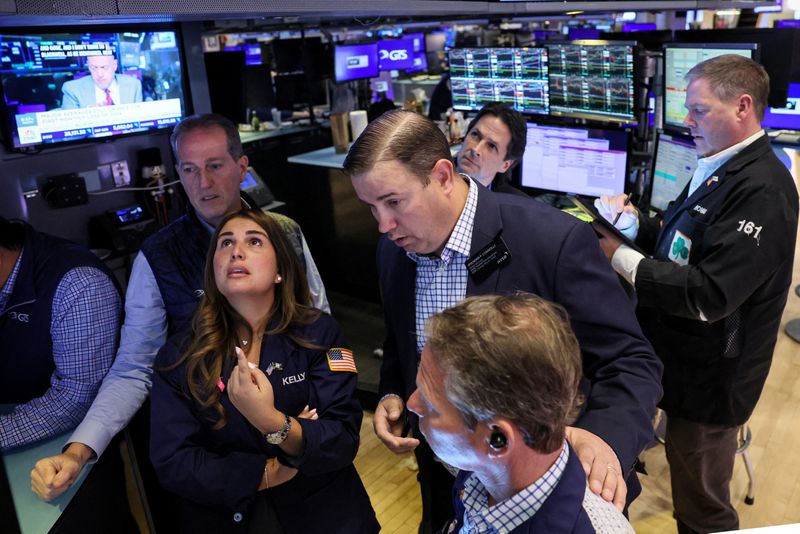By Harry Robertson
LONDON (Reuters) -Investors have gone from bracing for a U.S. recession to positioning for the world's biggest economy to keep chugging along.
European growth is also better than anticipated a few months ago, a challenge for traders trying to divine how much central bankers will lower interest rates.
Here's what markets tell us about the global economy:
1/ U.S. DEJA VU
Many analysts said this would be the year U.S. growth buckled, after the same predictions proved woefully wrong in 2023.
But the U.S. economy remains buoyant, maintaining pressure on prices. The Federal Reserve's preferred gauge of inflation rose to 2.7% in March, from 2.5% in February.
There are some signs of cracks: First-quarter growth came in well below expectations, as did April's employment figures.
As traders brace for higher-for-longer rates, bond yields have risen and prices have fallen, wiping out all of last year's gains. The S&P 500 stock index fell about 4% in April before rebounding in recent days.
Traders have gone from expecting six or seven Fed rate cuts at the start of the year to two currently.
"We've gone from extreme optimism (on rates) to extreme pessimism," said Aneeka Gupta, director of macroeconomic research at investment company WisdomTree.
"We're definitely seeing some mixed signals...In terms of the Fed, they're still likely to remain extremely cautious."
2) TEPID EUROPE
Britain and the euro zone have been less impressive but are starting to recover, adding to a sense that any rate cuts will be limited.
The euro zone economy returned to growth in the first quarter after a mild recession. British output grew in January and February.
While the European Central Bank is expected to deliver a June rate cut, with inflation in the bloc at 2.4% in April, rate cut bets have also been pared back.
Still, a relatively stronger U.S. economy has caused investors to flock to the dollar, pushing the euro down more than 2% this year.
"In the U.S., growth is above average, and in Europe, growth has been roughly zero," said Seamus Mac Gorain, head of global rates at JPMorgan (NYSE:JPM) Asset Management.
"Growth is picking up a bit...partly that's because real incomes have recovered."
3) COMMODITIES WAVER
Oil prices increased sharply in March and April as fears rose about a broader Middle East conflict between Israel and Iran. Supply disruptions and a pick-up in global demand also played a part in a commodities rally, especially for copper.
Yet prices have cooled again, with the S&P Goldman Sachs (NYSE:GS) commodities index down 4% since hitting a six-month high last month, a positive sign for central bankers trying to tame inflation.
Oil has risen and fallen with news on negotiations about a Gaza ceasefire. Investors will also keep tabs on China's economy, which grew by a quicker-than-expected 5.3% year-on-year in the first quarter.
4) STOCKS WOBBLE
Developed economy stocks fell around 4% in April after hitting record highs in March, before rallying again in May to sit roughly 1% below their peak.
Stocks and the economy have a mercurial relationship: sometimes good U.S. data has boosted equities, other times it has dented them. Some strategists believe the jump in U.S. borrowing costs has yet to fully register.
Yet indexes remain close to records around the world. An April Bank of America (NYSE:BAC) survey showed fund managers are at their most bullish in more than two years, believing central banks should still be able to bring down inflation without a damaging slump.
5) DOLLAR PAIN
The dollar has surged almost 4% so far in 2024, with bets on higher-for-longer interest rates sucking money back to the United States.
Almost all other currencies have suffered. India's rupee hit a record low in April, while Argentina's peso, Brazil's real and others have slumped.

A strong dollar makes debt denominated in the U.S. currency harder to service, piling pressure on emerging market economies. It can also make imports pricier, risking a return of inflation. Currency worries may make rate cuts less likely in emerging markets.
Countries are fighting back, however. Japanese authorities look to have intervened to boost the yen from its lowest level in 34 years, keeping foreign exchange traders alert.